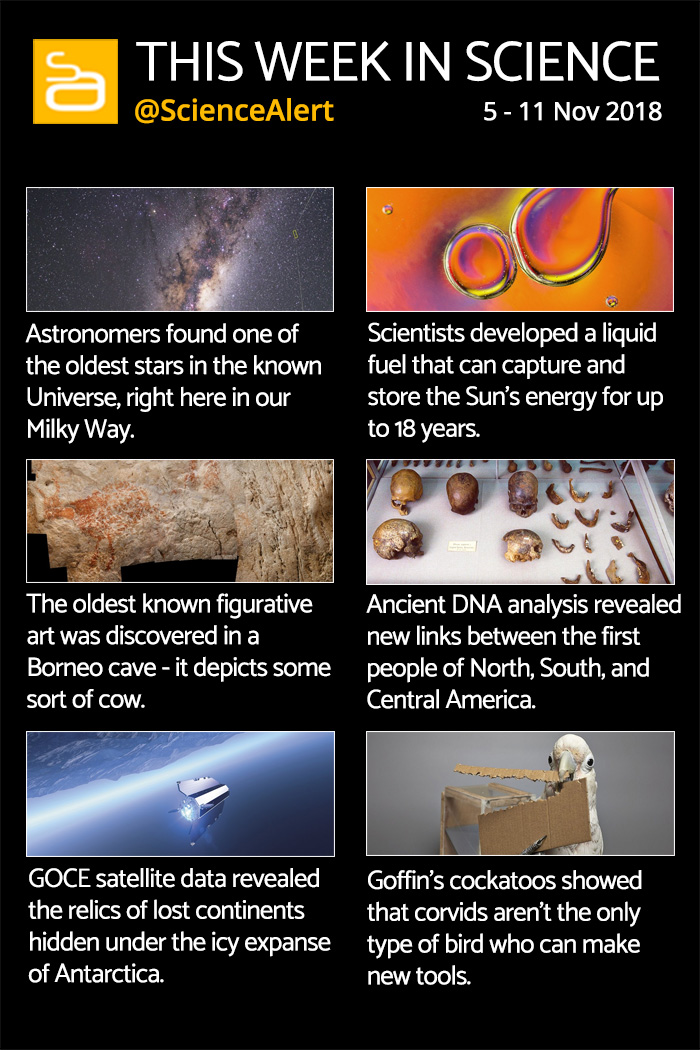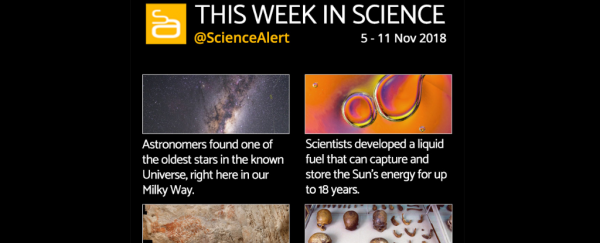Another week, another round of great achievements in science - from discovering the oldest figurative cave art we've ever seen, to gazing out into the Universe, there is always something new to learn about our world and beyond.
Below you'll find our weekly round-up of last week's science discoveries in a convenient picture you can easily share! Links to the stories are underneath.
 (ScienceAlert)
(ScienceAlert)
Astronomers Have Detected One of The Oldest Stars in The Entire Universe
Usually, truly ancient stars that formed right after the Big Bang are pretty far away from us. But astronomers have now spotted a star that's around 13.5 billion years old - and it's right here in our own Milky Way galaxy.
Scientists Develop Liquid Fuel That Can Store The Sun's Energy For Up to 18 Years
It's called a solar thermal fuel, and it's a specialised molecule in liquid form, composed of carbon, hydrogen, and nitrogen. In an exciting development, it can trap solar energy between chemical bonds, to be retrieved at a later time.
A Discovery in a Borneo Cave Just Crushed The Record For The Oldest Known Figurative Art
The discovery dates back to between 40,000 and 52,000 years ago, hidden in a cave deep in the forests of Borneo. The picture? Archaeologists think it's a depiction of some sort of cow species.
Ancient DNA Has Revealed Surprising Connections Between The First People of The Americas
The question of who were the first Americans has always been up for debate, so it's no wonder the latest DNA analysis of two sets of ancient American remains has brought up some fascinating results. Scientists have glimpsed an intricate web of movement and cross-pollination, revealing connections that stretch not just deep into South America, but perhaps around the world.
Satellite Data Has Revealed Relics of Lost Continents Hiding Under Antarctica
By using the Gravity Field and Steady-State Ocean Circulation Explorer (GOCE) satellite, researchers have glimpsed into the hidden tectonics of Earth in ways we don't normally get to see. As part of their work, they found hidden structures beneath Antarctica, revealing the icy continent's geological history.
Move Over Ravens, Cockatoos Can Make New Tools of Their Own
We hear a lot about the smarts of ravens and other corvids, but now Goffin's cockatoos are giving their dark-feathered brethren a run for their money - a team of these smart parrots has been found to rip pieces of cardboard into suitable tools to reach a goal. (Yes, the goal was food.)
Subscribe to our daily newsletter to stay up to date with all the most fascinating and inspiring science news as it happens.
